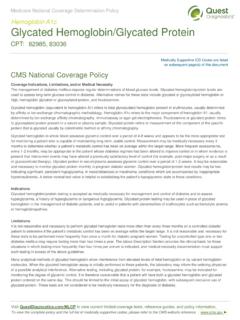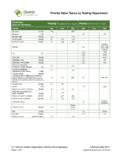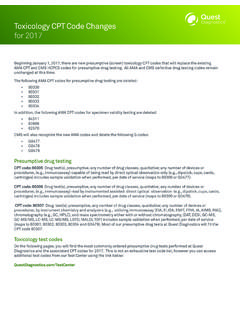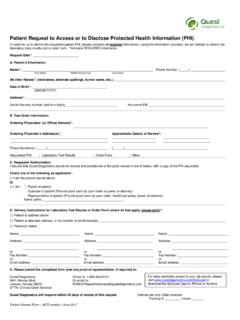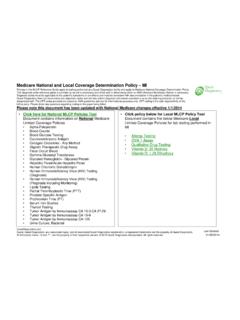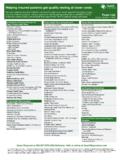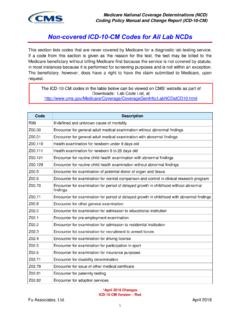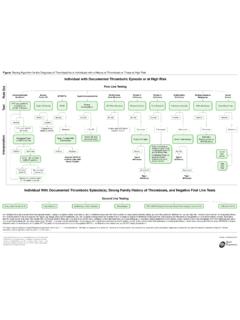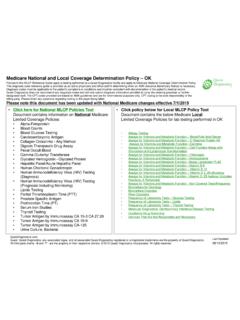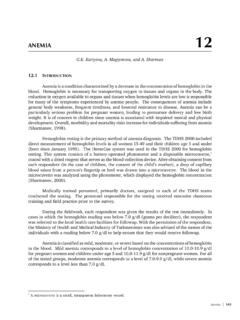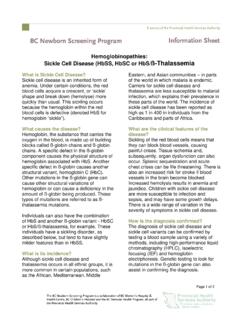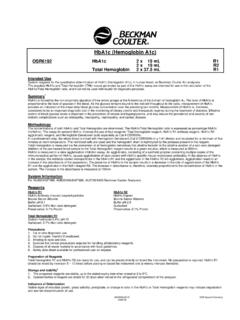Transcription of Glycated Hemoglobin/Glycated Protein - Quest Diagnostics
1 CPT:Medicare National Coverage Determination PolicyCMS National Coverage PolicyVisit view current limited coverage tests, reference guides, and policy view the complete policy and the full list of codes, please refer to the CMS website reference82985, 83036 Coverage Indications, Limitations, and/or Medical NecessityThe management of diabetes mellitus requires regular determinations of blood glucose levels. Glycatedhemoglobin/ Protein levels are used to assess long-term glucose control in diabetes. Alternative names for these tests include glycatedor glycosylated hemoglobin or Hgb, hemoglobin glycatedor glycosylated Protein , and (equivalent to hemoglobin A1) refers to total glycosylated hemoglobin present in erythrocytes, usually determined by affinity or ion-exchange chromatographic methodology.
2 hemoglobin A1c refers to the major component of hemoglobin A1, usually determined by ion-exchange affinity chromatography, immunoassay or agar gel electrophoresis. Fructosamineor glycatedprotein refers to glycosylated Protein present in a serum or plasma sample. Glycatedprotein refers to measurement of the component of the specific Protein that is glycatedusually by colorimetric method or affinity in whole blood assesses glycemic control over a period of 4-8 weeks and appears to be the more appropriate test for monitoring a patient who is capable of maintaininglong-term, stable control. Measurement may be medically necessary every 3 months to determine whether a patient s metabolic control has been on average within the target range.
3 More frequent assessments, every 1-2 months, may be appropriate in the patient whose diabetes regimen has been altered to improve control or in whom evidence is present that intercurrentevents may have altered a previously satisfactory level of control (for example, post-major surgery or as a result of glucocorticoid therapy). Glycatedprotein in serum/plasma assesses glycemic control over a period of 1-2 weeks. It may be reasonable and necessary to monitor glycatedprotein monthly in pregnant diabetic women. Glycatedhemoglobin/ Protein test results may be low, indicating significant, persistent hypoglycemia, in nesidioblastosisor insulinoma, conditions which are accompanied by inappropriate hyperinsulinemia.
4 A below normal test value is helpful in establishing the patient s hypoglycemic state in those conditions. IndicationsGlycatedhemoglobin/ Protein testing is accepted as medically necessary for management and control of diabetes and to assess hyperglycemia, a history of hyperglycemia or dangerous hypoglycemia. Glycatedprotein testing may be used in place of glycatedhemoglobin in the management of diabetic patients, andis useful in patients with abnormalities of erythrocytes such as hemolytic anemia or is not reasonable and necessary to perform glycatedhemoglobin tests more often than every three months on a controlled diabetic patient to determine if the patient s metabolic control has been on average within the target range.
5 It is not reasonable andnecessary for these tests to be performed more frequently than once a month for diabetic pregnant women. Testing for uncontrolled type one or two diabetes mellitus may require testing more than four times a year. The above Description Section provides the clinical basis forthose situations in which testing more frequently than four times per annum is indicated, and medical necessity documentation must support such testing in excess of the above analytical methods of glycatedhemoglobin show interference from elevated levels of fetal hemoglobin or by variant hemoglobin molecules.
6 When the glycatedhemoglobin assay is initially performed in these patients, the laboratory may inform the ordering physician of a possible analytical interference. Alternative testing, including glycatedprotein, for example, fructosamine, may be indicated for monitoring the degree of glycemic control. It is therefore conceivable that a patient will have both a glycatedhemoglobin and glycatedprotein ordered on the same day. This should be limited to the initial assay of glycatedhemoglobin, with subsequent exclusive use of glycatedprotein. These tests are not considered to be medically necessary for the diagnosis of hemoglobin A1cGlycatedHemoglobin/GlycatedProteinCPT :CodeDescriptionMedicare National Coverage Determination PolicyThe ICD10 codes listed below are the top diagnosis codes currently utilized by ordering physicians for the limited coverage test highlighted above that are also listed as medically supportive under Medicare s limited coverage policy.
7 If you are ordering this test for diagnostic reasons that are not covered under Medicare policy, an Advance Beneficiary Notice form is required. *Note Bolded diagnoses below have the highest utilizationDisclaimer: This diagnosis code reference guide is provided as an aid to physicians and office staff in determining when an ABN (Advance Beneficiary Notice) is necessary. Diagnosis codes must be applicable to the patient s symptoms or conditions and must be consistent with documentation in the patient s medical record. Quest Diagnostics does not recommend any diagnosis codes and will only submit diagnosis informationprovided to us by the ordering physician or his/her designated staff.
8 The CPT codes provided are based on AMA guidelines and are for informational purposes only. CPT coding is the sole responsibility of the billing party. Please direct any questions regarding coding to the payer being updated:Visit view current limited coverage tests, reference guides, and policy view the complete policy and the full list of codes, please refer to the CMS website reference , Quest Diagnostics , any associated logos, and all associated Quest Diagnostics registered or unregistered trademarks are the property of Quest Diagnostics . All third-party marks and are the property of their respective owners.
9 2016 Quest Diagnostics Incorporated. All rights Type 2 diabetes mellitus with diabetic Type 2 diabetes mellitus with diabetic chronic kidney Type 2 diabetes mellitus with other diabetic kidney Type 2 diabetes mellitus with diabetic neuropathy, Type 2 diabetes mellitus with diabetic Type 2 diabetes mellitus with other circulatory Type 2 diabetes mellitus with Type 2 diabetes mellitus with other specified Type 2 diabetes mellitus with unspecified Type 2 diabetes mellitus without Hyperuricemia without signs of inflammatory arthritis and tophaceous Impaired fasting Impaired glucose tolerance (oral)
10 Other abnormal Hyperglycemia, Other specified abnormal findings of blood Abnormal finding of blood chemistry, Long term (current) use of Other long term (current) drug therapy82985, 83036 There is a frequency associated with this test. Please refer to the Limitations or Utilization Guidelines section on previous page(s). 10/01/21 hemoglobin A1
